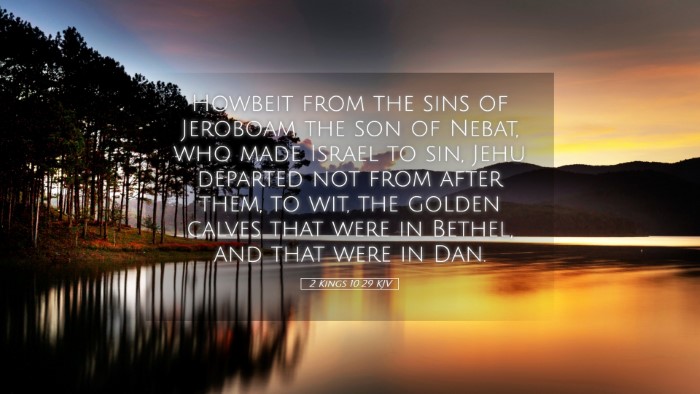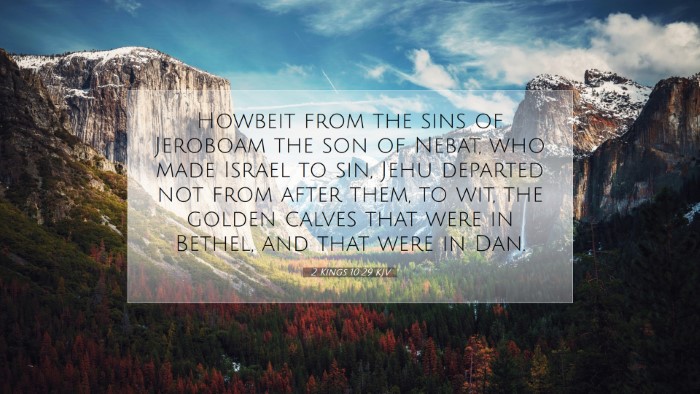Commentary on 2 Kings 10:29
2 Kings 10:29 states: "However, Jehu did not turn away from the sins of Jeroboam son of Nebat, which he had caused Israel to commit. He continued in those sins of worshiping the golden calves at Bethel and Dan."
Introduction
This verse presents a critical evaluation of Jehu's reign as king of Israel. While his zeal for the Lord was evident in his extermination of the house of Ahab and the Baal worshippers, this same fervor did not extend to correcting the idolatrous practices initiated by Jeroboam I. The commentary from historical theologians provides a deeper understanding of the implications of Jehu’s actions.
Theological Insights
Jehu started his reign with a notable zeal for purging Israel of the grievous sins associated with Baal worship, yet he did not address the root idolatry established by Jeroboam. This highlights a significant theological theme: one can be passionately devoted to God in some areas while neglecting critical aspects of His commands.
Matthew Henry's Perspective
According to Matthew Henry, Jehu’s failure to turn from the sins of Jeroboam was a grave error. Henry notes that despite Jehu's apparent obedience in reforming Israel's worship practices, he paradoxically continued to allow the worship of the golden calves, which was a direct violation of the commands of God. Henry emphasizes:
- "Partial obedience is disobedience." This suggests that Jehu's success in eradicating Baal worship was rendered ineffective due to his tolerance of the golden calves.
- "He only renovated the ceremonies of the past," which implies that while Jehu made strides against one form of idolatry, he ironically upheld another, leading to a false sense of reform.
Albert Barnes on 2 Kings 10:29
Albert Barnes provides keen insights on the socio-political ramifications of Jehu's reign. He states that by not renouncing the idol worship initiated by Jeroboam, Jehu’s reforms were superficial. Barnes elaborates on this concept:
- "Jehu’s actions reflect the political motivations behind his reforms." He suggests that Jehu sought to consolidate his power and unify his kingdom by not alienating the populace that adhered to Jeroboam's practices.
- "The retention of the golden calves shows the weakness of Jehu's spiritual commitment and the complexity of governance in Israel." This indicates how often political expediency can clash with divine commandments.
Adam Clarke's Commentary
Adam Clarke further explores the introduction of Jeroboam's sins into the narrative of Jehu’s reign. Clarke articulates that:
- "Idolatry in any form is a hindrance to true worship." Clarke argues that Jehu's failure to dismantle the calves at Bethel and Dan severely compromised the integrity of his kingship.
- "What is done in a half-hearted manner cannot fulfill divine purpose." This remark stresses the need for total commitment to the Lord’s commands, reflecting how selective zeal can lead to national downfall.
Lessons for Pastors and Theologians
As we ponder the implications of 2 Kings 10:29, several lessons emerge for pastors, theologians, and scholars:
- Call to Full Obedience: The passage underscores the necessity of complete adherence to God’s guidance without compromising or retaining elements that contradict His will.
- The Danger of Partial Reforms: It serves as a warning about the pitfalls of pursuing only selective reforms in religious practice, as Jehu exemplifies. True reformation of the church must address all areas of disobedience, not just some.
- Political vs. Spiritual Authority: The analysis stresses that political considerations can often overshadow spiritual integrity, encouraging leaders to prioritize divine mandates over human expectations.
Conclusion
In summary, 2 Kings 10:29 is more than just a historical account of Jehu’s reign; it serves as a profound lesson on the nature of true faith and obedience. The insights drawn from the public domain commentaries of Matthew Henry, Albert Barnes, and Adam Clarke reveal that reforming power must encompass all aspects of worship and commitment to God's law. As modern believers and leaders seek to navigate their callings, let this scripture remind us of the necessity for holistic adherence to God’s commands, moving beyond mere reformation to genuine transformation.


